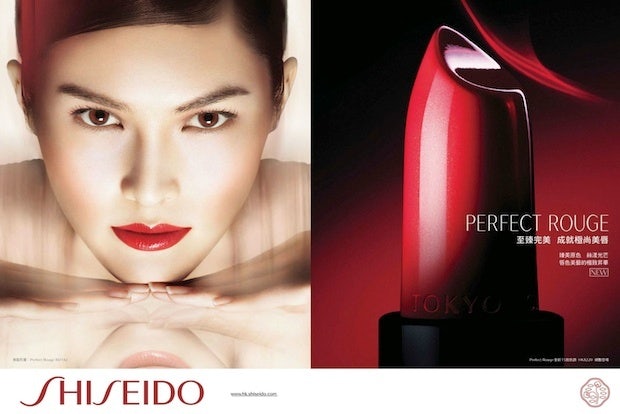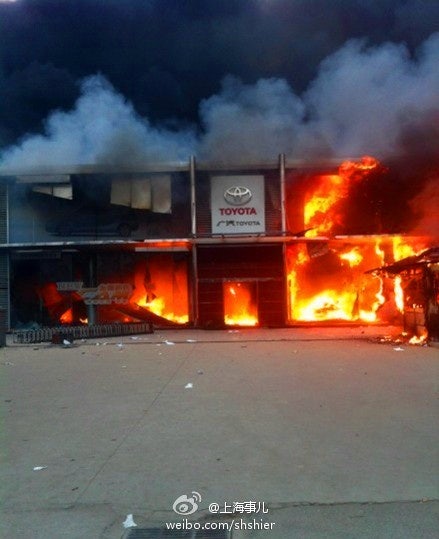
Chinese model Sui He in a 2013 ad for Japanese beauty company Shiseido, which felt the effects of anti-Japanese sentiment following the 2012 riots in China. (Shiseido)
A little over one year after China’s massive anti-Japan riots in 2012, it looks like things are heating up between the two countries once again, and Japanese companies are bracing for the impact.
After China’s chaotic and violent fall 2012 anti-Japan riots over the Senkaku/Diaoyu Island controversy, tensions had (sort of) cooled off between the two countries until Mao Zedong’s 120th birthday anniversary on December 26, 2013, when Japan’s Prime Minister Shinzo Abe made an inflammatory visit to the controversial Yasukuni Shrine in Japan. The site, which commemorates the war deaths of Japanese soldiers, is highly contentious in China and South Korea thanks in large part to its enshrinement of convicted war criminals from World War II and continued resentment of Japan for atrocities committed during the war. This visit was intended to stir Japanese nationalism, but Abe also clearly knew what he was getting himself into in terms of angering Chinese officials. Every time a Japanese head of state visits the memorial, it causes a massive uproar in China, which is why this happens to be the first time a sitting Japanese prime minister had visited since 2006. However, he was likely hoping that the domestic political gain would outweigh the diplomatic backlash from China and other countries.
You know things must be getting bad between two countries when some of their top diplomats start calling each other “Voldemort” in the international media, which is exactly what China and Japan have been doing over the past few days. On January 1, China’s ambassador to the United Kingdom, Liu Xiaoming, wrote in an incendiary Telegraph op-ed, "If militarism is like the haunting Voldemort of Japan, the Yasukuni shrine in Tokyo is a kind of horcrux, representing the darkest parts of that nation's soul." In response, the Japanese ambassador, who apparently isn’t very creative about comebacks, wrote a retort entitled "China risks becoming Asia's Voldemort." These Harry Potter-inspired insults hurled at one another would be humorous if the situation wasn’t so serious, with pundits asking if the two countries may be “fanning the flames of war.”
One of the groups that is likely the most unhappy about this news is comprised of Japanese consumer brands that are highly dependent on the China market. During last year’s riots, nationalistic sentiment caused their China sales to plummet, and many have only recently begun to bounce back.
Japanese car companies suffered the most public damage from the 2012 protests—literally. Enflamed rioters torched the Japanese vehicles of many unfortunate bystanders, while Honda and Toyota dealerships were burned down in Qingdao. Auto companies’ sales suffered the aftermath once the chaos subsided: Toyota and Honda both reported their first annual sales declines in China as a result of boycotts of Japanese goods. Recent sales numbers probably had these brands thinking they had survived the worst of the tensions, since Toyota and Honda both recently reported solid annual sales growth in 2013. Toyota saw an increase of 9.2 percent in annual year-on-year sales, while Honda sold 26 percent more vehicles last year.

A Toyota dealership set on fire in Qingdao during China's anti-Japan riots in 2012. (Sina Weibo)
However, Japanese automakers are now bracing for a new round of disputes. Nissan stated that it was “closely monitoring” developments, but admitted that it wouldn't be able to do much if more riots did break out. “As a company we have no means to intervene in politics,” Huo Jing, a Beijing-based spokeswoman for Nissan, told Bloomberg. According to Bloomberg, even Chinese consumers unconcerned with engaging in boycotts might become scared that if they bought a Japanese car, it would be torched by crazed rioters:
“They chose today to visit the shrine, which makes it even harder for Chinese people to accept,” said Cui Dongshu, deputy secretary-general of the Shanghai-based Passenger Car Association. “The signal they are sending is very dangerous. It will deter some buyers as they may worry about the safety issue of their car and even themselves if the political environment worsens.”
Japanese beauty companies also rely heavily on China growth, and Shiseido was another brand that felt the effects of boycotts. The company recently stated to Bloomberg that it would not comment on government issues, but admitted in its annual sales report in March 2013 that its China sales had suffered from anti-Japanese sentiment. “In China, all of our employees are in crisis mode,” said the report.
As a result, the brand undertook a comprehensive strategy to bounce back, stating, “The unusual circumstances did not change the importance of China to Shiseido.” In addition to an overhaul of its personnel situation, the company strengthened investment in two of its China brands that were “not significantly exposed to anti-Japanese sentiment because they are not marketed under the Shiseido name." These include AUPRES, a national brand in the department store channel, and urara, a brand marketed exclusively through cosmetics specialty stores in China.
It is yet to be seen how far new tensions will escalate, and as a result, how large of an effect they will have on Japanese companies this time around. Previously, Shiseido had predicted a “full-fledged recovery” for 2014, but new developments could hamper sales once again. The sentiments of Japanese brands can be summed up by a Japanese parts manufacturer in China interviewed by Japan Times: The timing [of Abe’s visit to Yasukuni] was just when things had finally calmed down. I hope things won’t go back to square one.”